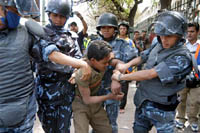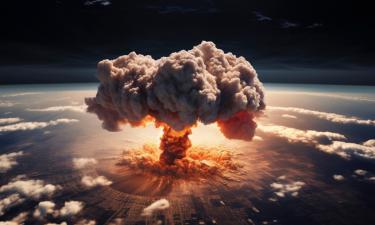Curfew’s protester death toll reaches 14 in Nepal
Nepal 's royal government imposed an 11-hour curfew in the capital Friday, as another protester wounded a day earlier at a rally against King Gyanendra's rule died taking the number of demonstrators killed by security forces to 14. Despite the curfew warnings, protesters were preparing to take to the streets again Friday. A day earlier, police opened fire on protests attended by tens of thousands of people for defying a 25-hour curfew, killing at least three on the spot and wounding dozens more.

Notices posted by the government early Friday said the 9 a.m.-8 p.m. curfew must be observed in the capital Katmandu, the suburbs of Lalitpur and Bhaktapur, and in Pokhara, a resort town 200 kilometers (125 miles) west of the capital. The notices warned people to stay indoors during the curfew hours and that those who violate the order will be shot, adding that the curfews were imposed "to protect the people, property and peace."
The protester who died at a hospital early Friday became the 14th person to be killed by security forces firing on demonstrations against the king's rule since opposition parties launched a general strike April 6. He was among 26 people shot at Gulariya, 500 kilometers (310 miles) south west of Katmandu , during a protest Thursday.
The Defense Ministry said in a statement that security forces were compelled to open fire because the situation was getting out of control. The statement claimed 13 policemen were also wounded in clashes with the protesters who vandalized government offices and tried but failed to set them on fire.
Police also opened fire at a demonstration Thursday in the Kalanki neighborhood on the western edge of Katmandu , killing three protesters. Stretches of the main road that circles the city were littered with bricks and burning tires. An estimated 100,000 people walked from surrounding villages to march peacefully along the main road that circles the capital city.
A government official, speaking on condition of anonymity because he is not authorized to speak to the media, said Friday's curfew was necessary to prevent more violent protests. Friday morning, security was tight in Katmandu where armed soldiers in armored vehicles guarded the deserted streets. Katmandu residents rushed to the markets to buy food and supplies before curfew began. Some stores were open and selling their stock. Shortages of fresh food and cooking fuel continued in Katmandu because of the general strike.
Notices posted around the capital asked government workers to report to work before the curfew began. More than two weeks of often violent protests and a general strike against palace rule have paralyzed the Himalayan country, leaving cities short of food and fuel and Nepal at its most volatile since King Gyanendra seized power 14 months ago, reports the AP.
N.U.
Subscribe to Pravda.Ru Telegram channel, Facebook, RSS!




